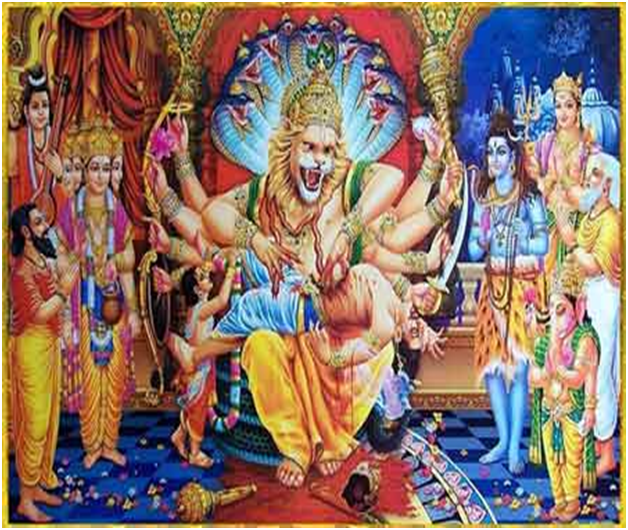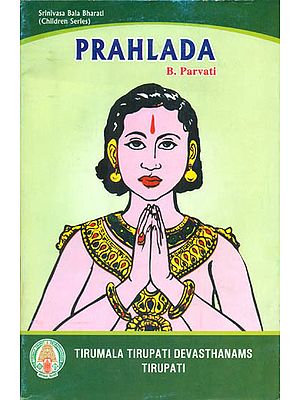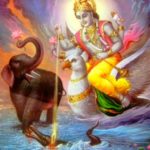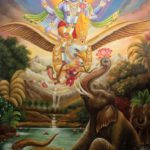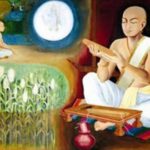The following Post is based on the Translation of Professor T.S.B. Narasaraju garu.
Continuing Andhra Cultural Portal’s Spotlight on Telugu Literature is a wonderful work based on one of the most beloved texts in Telugu Poetry.
Longtime readers may recall our Series of Excerpt articles on the excellent English translation of Pothana‘s Telugu Bhagavatamu by Sri T.S.B.Narasaraju.
The preceding episode was on Gajendra Moksham. Below we provide an excerpt from T.S.B. Narasaraju garu’s new book:
Book
After 3 year hiatus, the Professor has returned with an exquisite rendition of the famed episode Prahlada Charitra. But why bandy words when a veritable Swami of Chinmaya Mission has complimented this Telugu scholar. Here is the foreword to this Publication. You may directly download the whole translated Prahlada Charitra by clicking here:
Click here to download Part I of the English Translation of Potana’s Bhagavata Purana (Prahlada Charitra)
[Excerpt. Some emphasis ours.]
Copyright: T.S.B.Narasaraju. All rights reserved. 2024.
Foreword
Life on earth is sustained by many essentials. The most important among them, to live with joy and enthusiasm, is love-divine. Although Sri Bhagavata Purana is the quintessence of Karma, Bhakti and Jnana, it primarily elicits love-divine which is transcendental in its experience. Blessed are those who drank the nectar of love! Blessed are the Gopikas who could taste it and got completely merged with Sri Krishna Chaitanya!
There are many translations of Vyasa Bhagavata Purana into several Indian languages. Its translation into Telugu by Sri Bammera Potana of fourteenth century stands on a high pedestal both in its language and sweetness of Bhava. Its verses are sublime in thought, sweet to chant and easy to memorise. They bring out a vivid picture of stories and expressions of feelings of characters, especially the Leelas of Bhagawan Sri Krishna, even to ordinary readers who wish to read them as stories.
Telugu literature with all its lofty thoughts and rich translations is being slowly forgotten by the masses in the din and roar of modern life and its various compulsions. The fact that Puranas, epics and Upanishads, among others, build the character of our nation is not remembered and replaced with a modern craze for standard of living leading to dangerous tendencies. Such a trend causes all kinds of unhealthy comparisons and hatred among people resulting in destruction. These great texts that build character among human beings are going out of reach. Efforts must be made to bring a fresh breeze of life through a revival of a desire for higher knowledge.
It is with this sincere and dedicated thought that some aspects of Potana`s Bhagavata Purana have been brilliantly translated by Sri T. S. B. Narasaraju into English for the benefit of many residing abroad who lost touch with their mother-tongue, Telugu. Sri Raju`s heart throbbed with enthusiasm to bring Potana`s Bhagavata Purana to children of Telugu resulting in the form of this book. His translation is lucid and deep in its flavour. Without losing the essence of the original he brought out the translation in an exemplary manner using simple and effective language. The work is inspiring and holds the reader`s mind with inquisitiveness to read further. It is lucid in style and flows with beauty of expression. The content is absorbing.
It is not an easy task to bring out expressions from Potana`s verses into English. Sri Raju achieved this because of his devotion to the Lord, sincere self-application and taking up the work as a Tapas. I am sure that this work reaches the hands of many inspiring them to read, understand and cultivate the great ideals of Rishis of yore getting motivated to live as beacons of light to many around their lives. May Lord Sri Krishna bless one and all! Hari Om!
Swami Chidrupananda
Head, Noida Centre, Chinmaya Mission, New Delhi and
Director, All India Chinmaya Youth Kendra, Noida
April 24, 2024
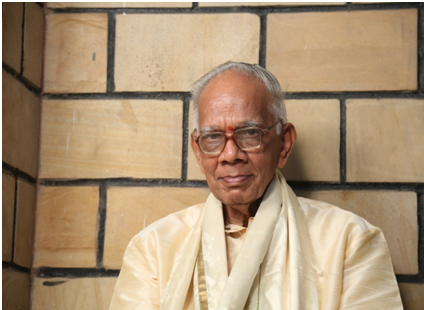
- Some Biographical Aspects of the Author
The author was born in Rajahmundry, Andhra Pradesh, India, to late Sri Talluri Syamala Rao and Srimati Surya Prabhavatamma on June 7, 1935. He had his earlier education in the V. T. H. School and the Government Arts College, Rajahmundry. He got his M. Sc. Degree with specialization in Chemistry from the Banaras Hindu University, Varanasi, in 1957, and joined the Department of Chemistry of the University as a Lecturer. He went on study-leave to the University of Hamburg, Germany by virtue of a Research Fellowship awarded by Government of India and got the Ph. D. Degree in Chemistry of the University in 1964. He was married to Srimati Seetha Devi and has a son and a daughter. He was promoted as a Reader in B. H. U. in 1970 and went to the North-Eastern Hill University, Shillong as a Professor in 1979. He published several research papers in national and international journals and supervised the research work of a large number of Ph.D. students. After retirement in 1995, he served the Acharya Nagarjuna University, Guntur, as a UGC-Visiting Professor.
He stays in Hyderabad, Telangana. He can be contacted through mobile no. 9949243339 and email: shaamran@gmail.com.
ASHTAMA SKANDHA OF POTANA`S PRAHLADA CHARITRA
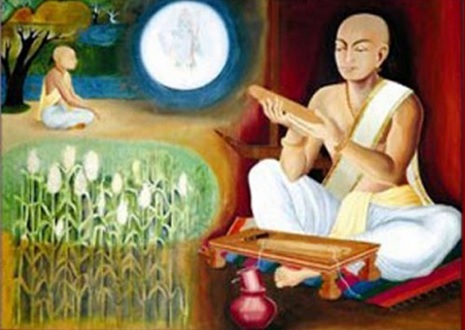
Invocation
“Srimannama! Payodasyama! Dharabhrulalama! Jagadabhirama! Ramajanakama! Mahoddama! Gunastomadhama! Dasaradharama!……………. Bammera Potana
(“Dasaradharama! You have a name which causes good to all. You have a complexion similar in colour to that of rain-producing clouds. You are an ornament to the earth. You are the most handsome. Women are attracted by you. You are the most majestic. You are an abode of all virtues.”)
“Adaramoppa mokkididunu adrisuta hrudayanuraga sampadiki doshabhediki prasanna vinodiki vighnavallika chediki manjuvadikin ashesha jagajjanandavedikin modaka khadikin samada mushikasadiki suprasadikin” ……………………………Bammera Potana
(I salute to him who is a recipient of maternal love of goddess Parvati, a cleanser of sins, a source of pleasure to his devotees, a destroyer of impediments, adept in talking sweetly and a centre of joy to his countless number of devotees. He relishes Modakas, granting what all is good, being seated on a Mooshikavahana.)
“Vidyadayaka! Vinayaka! Padyagadyapradayaka! Adyantarahita! Kalushitamidhyavinasaka! Suradhyaksha! Mooshikamadhyasthita! Bhooshitanaravarasevita!” ……… Narasaraju
(Vinayaka! You are the donor of knowledge. You confer competence to write poetry and prose. You have neither a beginning nor an end. You destroy tarnished vision of imagining the creation to be true. You are the leader of Devatas. You are seated on the back of a Mooshika. You are the saviour of the virtuous among men.)
“Evvaniche janinchu; jagamevvani lopalanundu leenamai;
Evvani yandu dindu; barameswaru devvadu; mula karanam
Bevva; danadhimadhyalayu devvadu; sarvamu danayayana va
Devvadu vani natmabhavu neeswarune saranambu vededan.”…….. Bammera Potana
(I seek protection from the supreme ruler of the universe, who is responsible for its genesis, in whom it exists getting ultimately merged with him, who is the supreme being considered as soul of the universe being its root-cause, who transcends the processes of birth, existence and death and who is all-pervading being the primordial Atma permeating in all.)
[…]
Bhagavata Purana emphasises the concept of Navavidha Bhaktis, the nine established forms of Bhakti towards the Lord, mentioned in Narada’s Bhakti Sutras. These are: 1. Sravana (Listening), 2. Sankeertana (Praising), 3. Smarana (Remembering), 4. Paricharya (Serving), 5. Archana (Worshipping), 6. Vandana (Prostrating), 7. Dasya (Serving), 8. Sakhya (Befriending) and 9. Atma Nivedana (Surrendering).
Prahlada Charitra is the principal constituent of the Seventh Canto (Saptama Skandha) of Bhagavata Purana. The different facets of devotion to the Lord, constituting his goal in life, are glorified by Potana in this work through the utterances of Prahlada. Among the nine forms of devotion, mentioned above as Navavidha Bhaktis of Narada, the role of Smarana (Remembering) the Lord in achieving realization of god has been emphatically illustrated by Potana in Prahlada Charitra
The following are some aspects mentioned by the famous “Karuna Sri”, Jandhyala Papayya Sastry, in his introduction to the Saptama Skandha of Bhagavata Purana published by Tirumala Tirupati Devasthanamulu, Tirupati:- Prahlada is considered to be the most prominent among the devotees of the Lord being an embodiment of all virtues. Among a galaxy of staunch devotees of Lord Narayana such as Narada, Parasara, Pundarika, Vyasa, Ambareesha, Suka, Saunaka and Bheeshma, Prahlada is considered to be the foremost. Potana describes Prahlada as “Sri Narayana pada padma yugali chintamruta swada sandhanudu” which means that he is adept in relishing the nectar derived from a ceaseless remembering of the lotus-shaped feet of Lord Narayana. The grace of the Lord showered on Prahlada after being subjected to diverse forms of cruelty by his father, Hiranyakasipu. The utterances of Prahlada such as, “Kamalaskshu narchinchu karamulu karamulu”, “Kanjakshunakugani kayambu kayame”, “Samsarajeemutha sanghambu vichune”, “Mandara makaranda madhuryamuna delu”, “Indu galadandu ledani, and “Chakri chintaleni janmambu janmame”, among others, substantiate the intensity of his devotion to the Lord and his implicit faith in the omnipresence of the Lord. It is no wonder that such verses composed by another great devotee of the Lord, Potana, became house-hold verses stored in the memory and often recited at contextual importance by countless number of Telugu-speaking people.
Click here to download Part I of the English Translation of Potana’s Bhagavata Purana (Prahlada Charitra)
Disclaimer: This book represents the opinions of Author, and should not be considered a reflection of the views of Andhra Cultural Portal. The author is responsible for ensuring the factual veracity of the content, herein.
Copyright: T.S.B.Narasaraju. All rights reserved. 2024.
